Discover the best countries to source wicker bags, baskets, and lifestyle products in 2025. Deepwear connects fashion brands with sustainable artisans and trusted manufacturers.
Wicker has never really left the fashion stage—it simply resurfaces stronger with each new season. From Jane Birkin’s basket bag in the 1970s to today’s luxury houses reworking raffia and rattan into their collections, wicker has long been celebrated for its charm, utility, and cultural roots. Across Asia, artisans have been weaving natural fibres into bags, baskets, and lifestyle objects for centuries, proving just how durable and versatile this craft truly is.
What makes wicker unique isn’t just its rustic appeal, but its ability to move seamlessly from beach markets to fashion weeks, from homes to boutiques. At Deepwear, we see wicker as a bridge between heritage and innovation—an opportunity for brands to create sustainable wicker bags, baskets, and eco-friendly lifestyle products rooted in global traditions.
In this blog we cover:
- Why wicker continues to be a standout material in fashion and lifestyle markets
- The sustainability, durability, and versatility that make wicker appealing to modern consumers
- How cultural heritage and artisanal craftsmanship add value and authenticity to wicker products
- The best countries to source wicker, including bags, baskets, and lifestyle items, with pricing and MOQs
- How Deepwear supports brands in sourcing, production oversight, and market-ready product delivery
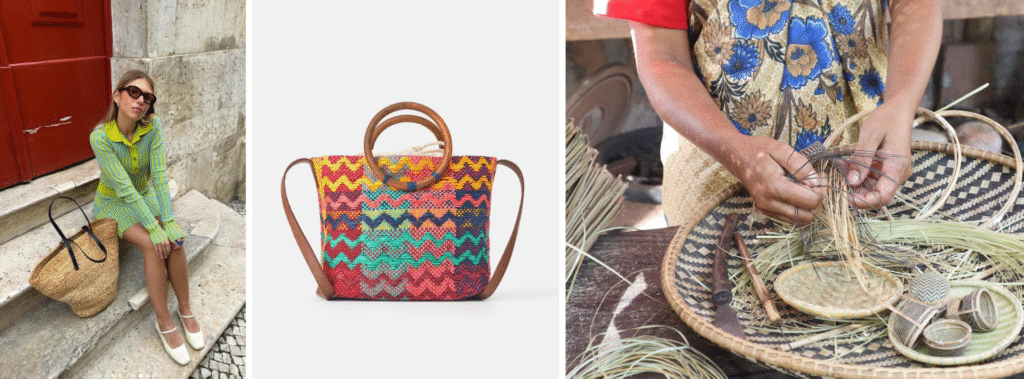
Why wicker is back (and never really left)
Global fashion and lifestyle markets are once again embracing wicker, but its popularity runs deeper than seasonal trends. For many consumers, it represents the sweet spot between sustainability, artisanal basket weaving, and style. Luxury buyers value its heritage, while lifestyle shoppers are drawn to its practicality and eco-friendly story. In home décor, its timeless aesthetic blends effortlessly with minimalist, rustic, and contemporary interiors.
- Eco-friendly and sustainable: Made from renewable natural materials like rattan, abaca, pandan, and ata grass, wicker stands out as a biodegradable alternative with a lower environmental footprint. This makes it highly attractive to conscious consumers and allows brands to highlight a strong eco-story in their campaigns.
- Durability that lasts: Beyond its beauty, expert weaving techniques give wicker products impressive strength and resilience. From beach totes to structured handbags, these pieces retain their shape and premium feel, making them worthy investments at both wholesale and retail levels.
- Versatility across markets: The material’s adaptability extends well beyond handbags. It is equally sought after for storage baskets, home décor accents, picnic hampers, and even furniture, creating opportunities for brands to diversify into multiple eco-friendly lifestyle products.
- Cultural heritage and craftsmanship: Every wicker product reflects centuries of artisanal skill. Regional weaving patterns and techniques tell stories of culture and tradition, adding authenticity that resonates with modern consumers. This heritage-driven value gives brands a unique way to stand out in competitive markets.
For more on how traditional crafts inspire today’s runways, read our piece on culture-driven fashion trends.
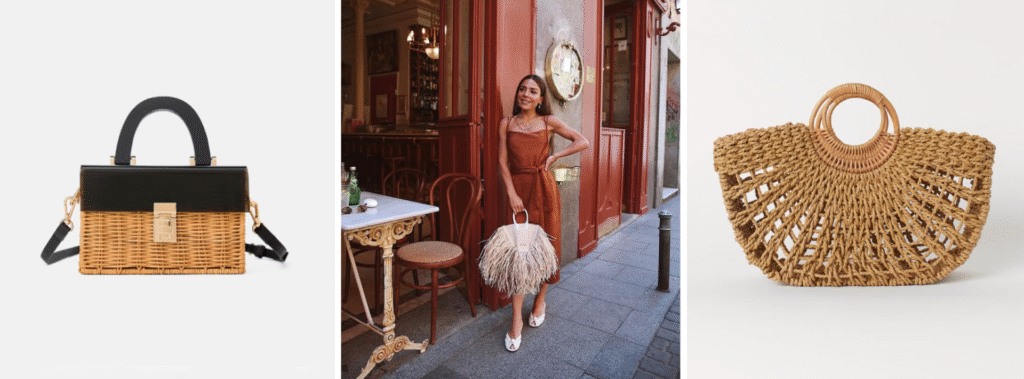
Best countries to source wicker products
At Deepwear, we draw on both our regional presence and multicultural team to connect brands with reliable suppliers and workshops, helping manage everything from the first sampling phase to the final delivery. Below, we highlight some of the best global wicker manufacturing destinations, along with estimated MOQ and wholesale pricing to guide your planning.
1. Philippines: The Philippines is known for its skilled rattan and abaca artisans, particularly in Visayas and Mindanao. Products from this region are strong, durable, and carry a rich artisan narrative that resonates with customers. For brands, sourcing from the Philippines provides items that combine quality, cultural value, and accessibility. At Deepwear, we can connect brands with suppliers and oversee production from initial sourcing to final product delivery.
- Why source here: Intricate weaving expertise in rattan and abaca-based products.
- Costs & MOQ: Wholesale $8–15 per bag; MOQs typically 100+ pcs, smaller runs negotiable.
2. Indonesia: Indonesia offers a wide variety of woven products, from Bali’s grass round bags to Java’s contemporary fashion shapes. These pieces are visually striking and versatile, making them appealing for lifestyle and fashion brands alike. Deepwear can facilitate communication with artisan cooperatives and oversee production, helping brands navigate both traditional and export-ready designs.
- Why source here: Combination of traditional and modern designs from skilled artisan cooperatives.
- Costs & MOQ: Wholesale $10–18 per bag; MOQs 20–100 pcs depending on supplier.
3. Thailand: Thailand merges traditional weaving with contemporary aesthetics, particularly in Chiang Mai and Isaan. Materials such as pandan, water hyacinth, and rattan are often combined with leather or fabric trims. Thai products appeal to brands looking for modern interpretations of heritage crafts. With Deepwear’s local presence, brands can access these workshops and oversee production efficiently.
- Why source here: Skilled craftsmanship with modernized designs suitable for fashion-forward collections.
- Costs & MOQ: Wholesale $12–20 per bag; MOQs 50–100 pcs depending on design complexity.
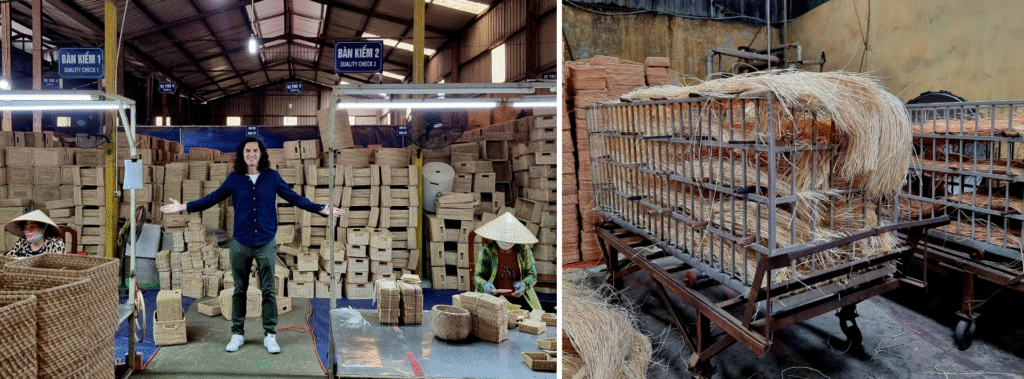
4. Vietnam: Vietnam is growing as a source for rattan and bamboo products, offering both artisanal quality and scalable production. Northern regions focus on finely woven handbags, while southern regions produce furniture and larger lifestyle items. This makes Vietnam suitable for brands looking for cost-effective sourcing with consistent results. Deepwear can coordinate with factories and artisans, overseeing production from start to finish.
- Why source here: Skilled artisans and factory capacity for mid- to large-scale orders.
- Costs & MOQ: Wholesale $9–16 per bag; MOQs ~100 pcs/style; lead times ~30 days.
5. South Africa: South Africa produces wicker products with distinctive regional character, particularly in KwaZulu-Natal and Limpopo. Skilled artisans work with palm leaves, reeds, and synthetic alternatives to make lifestyle objects and small accessories. These items are ideal for brands seeking niche, culturally rooted products. Deepwear can coordinate sourcing and production in the region, providing access to emerging artisan and industrial suppliers.
- Why source here: Unique regional materials and weaving traditions.
- Costs & MOQ: Wholesale $15–25 per item; MOQs vary depending on supplier and product type.
6. Morocco: Morocco is renowned for its rich weaving traditions, particularly in regions like Fez, Marrakech, and the Rif Mountains. Artisans work with rattan, palm leaves, and natural fibers to create bags, baskets, and home décor items with intricate patterns and vibrant textures. These products appeal to brands seeking unique, culturally rooted designs that stand out in fashion and lifestyle markets. With Deepwear’s guidance, brands can connect with Moroccan workshops and oversee production from sampling to final delivery.
- Why source here: Distinctive North African weaving techniques and strong artisan heritage.
- Costs & MOQ: Wholesale $5–30 per item; MOQs typically 50–100 pcs depending on product type and complexity.
Cost Disclaimer: The wholesale prices and MOQs listed above are estimates based on market averages. Actual costs may vary depending on the supplier, product specifications, order quantity, and seasonal factors. We encourage brands to obtain a full quote before confirming production.
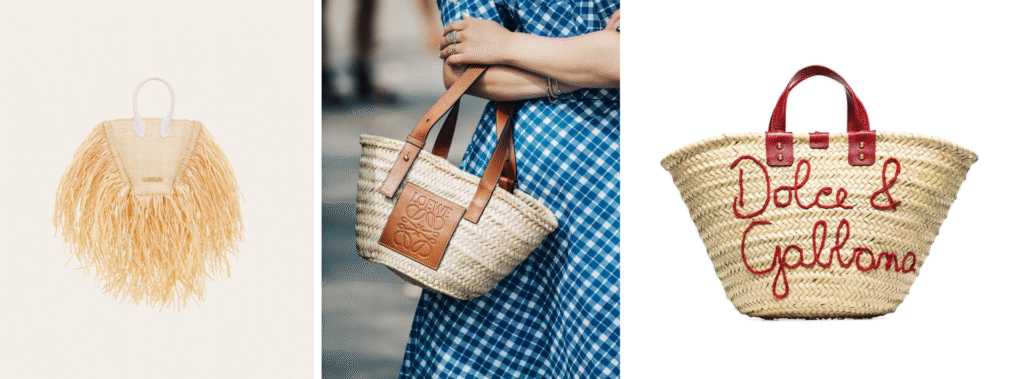
What Are the Best Countries to Source Wicker in 2025?
The top wicker sourcing destinations include the Philippines, Indonesia, Thailand, Vietnam, South Africa, and Morocco. Each offers unique weaving traditions, price points, and MOQs. Deepwear wicker sourcing experts help brands navigate these markets by connecting them with vetted artisans and overseeing production.
Why work with Deepwear for wicker sourcing
Deepwear supports brands in connecting with artisans and manufacturers across Asia and South Africa, providing guidance throughout the sourcing and production process. Our teams combine local knowledge with multicultural expertise, helping clients access authentic, market-ready wicker products.
- Local presence: Offices and team members across Thailand, Vietnam, South Africa, and connections in the Philippines and Indonesia.
- Scale + authenticity: Bridges small-batch artisan workshops with larger production, maintaining quality and heritage appeal.
- Ethical sourcing: Focused on sustainability and fair practices while keeping products market-ready.
- Market-ready expertise: Can assist with material selection, design consultation, and overseeing production from sourcing to final product.
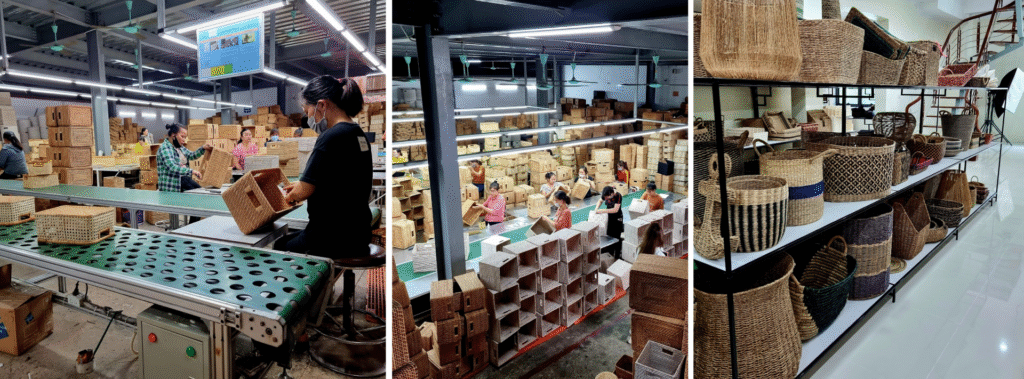
Bringing the Strands Together
Wicker continues to prove itself as more than just a passing trend—it’s a category that blends sustainability, durability, and cultural craftsmanship. For brands, sourcing wicker products means tapping into a story that resonates with both eco-conscious consumers and those seeking authentic, timeless design. Whether it’s the finely woven abaca of the Philippines, the ata grass classics of Bali, or Vietnam’s scalable rattan production, the opportunities are vast across fashion and lifestyle markets.
At Deepwear, we help brands navigate this sourcing landscape by connecting them with trusted artisans and manufacturers across multiple sourcing regions. From sampling to final delivery, our local presence and market expertise allow us to guide clients toward collections that are authentic, market-ready, and aligned with sustainable practices. Wicker may be steeped in tradition, but with the right partnerships, it offers endless potential for the future of fashion and lifestyle products.
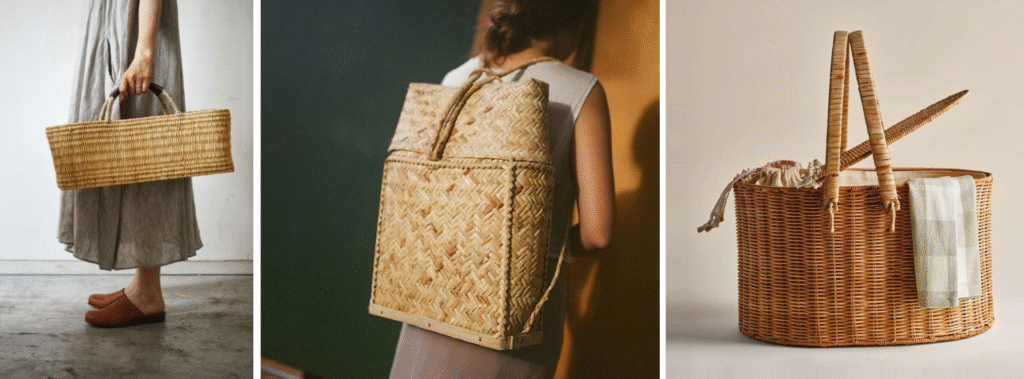
Ready to source authentic, sustainable wicker products? Book a strategy call with Deepwear’s sourcing consultants or explore our global wicker catalogue today.